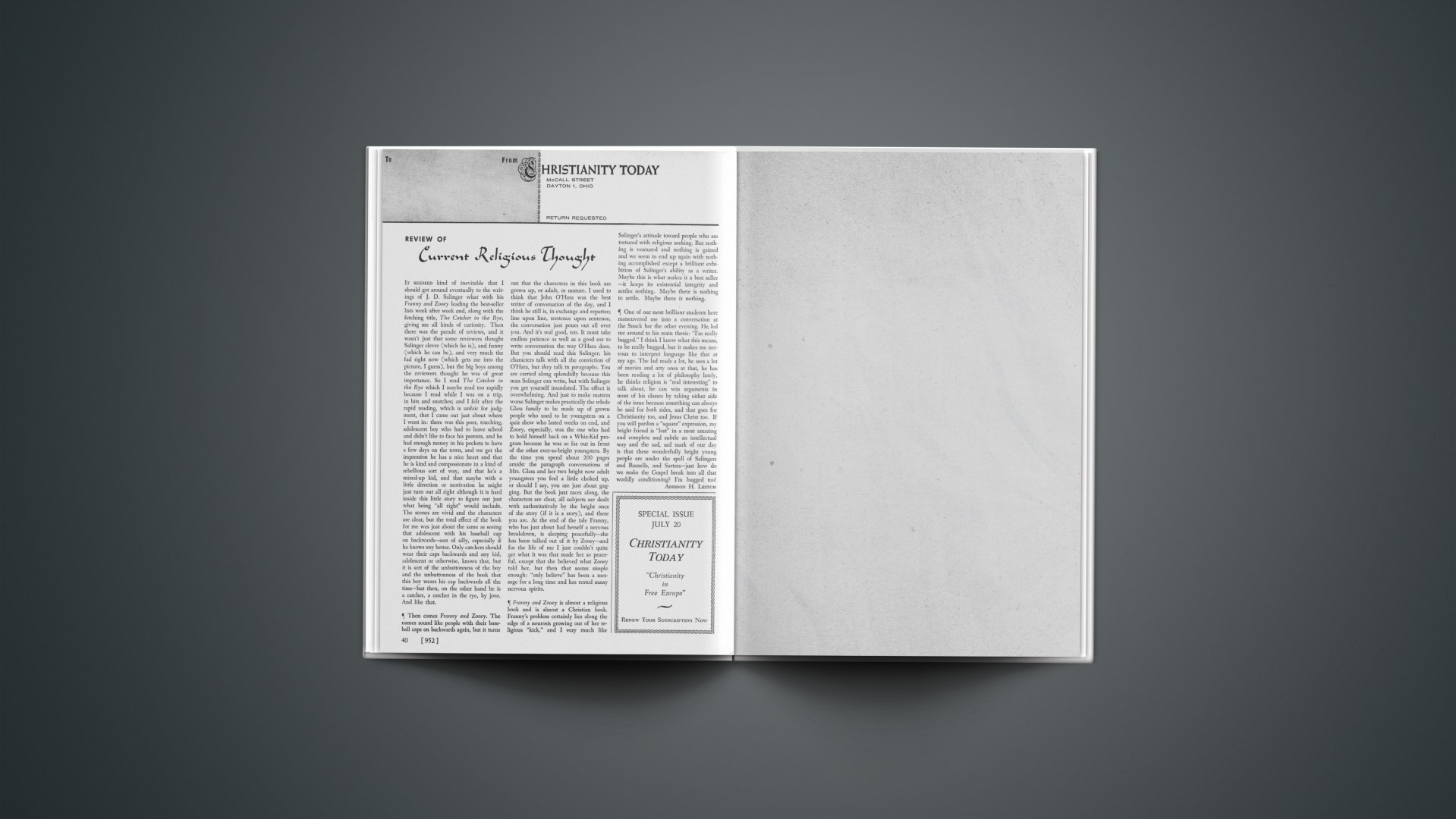IT SEEMED kind of inevitable that I should get around eventually to the writings of J. D. Salinger what with his Franny and Zooey leading the best-seller lists week after week and, along with the fetching title, The Catcher in the Rye, giving me all kinds of curiosity. Then there was the parade of reviews, and it wasn’t just that some reviewers thought Salinger clever (which he is), and funny (which he can be), and very much the fad right now (which gets me into the picture, I guess), but the big boys among the reviewers thought he was of great importance. So I read The Catcher in the Rye which I maybe read too rapidly because I read while I was on a trip, in bits and snatches; and I felt after the rapid reading, which is unfair for judgment, that I came out just about where I went in: there was this poor, touching, adolescent boy who had to leave school and didn’t like to face his parents, and he had enough money in his pockets to have a few days on the town, and we get the impression he has a nice heart and that he is kind and compassionate in a kind of rebellious sort of way, and that he’s a mixed-up kid, and that maybe with a little direction or motivation he might just turn out all right although it is hard inside this little story to figure out just what being “all right” would include. The scenes are vivid and the characters are clear, but the total effect of the book for me was just about the same as seeing that adolescent with his baseball cap on backwards—sort of silly, especially if he knows any better. Only catchers should wear their caps backwards and any kid, adolescent or otherwise, knows that, but it is sort of the unbuttonness of the boy and the unbuttonness of the book that this boy wears his cap backwards all the time—but then, on the other hand he is a catcher, a catcher in the rye, by jove. And like that.
Then comes Franny and Zooey. The names sound like people with their baseball caps on backwards again, but it turns out that the characters in this book are grown up, or adult, or mature. I used to think that John O’Hara was the best writer of conversation of the day, and I think he still is, in exchange and repartee; line upon line, sentence upon sentence, the conversation just pours out all over you. And it’s real good, too. It must take endless patience as well as a good ear to write conversation the way O’Hara does. But you should read this Salinger; his characters talk with all the conviction of O’Hara, but they talk in paragraphs. You are carried along splendidly because this man Salinger can write, but with Salinger you get yourself inundated. The effect is overwhelming. And just to make matters worse Salinger makes practically the whole Glass family to be made up of grown people who used to be youngsters on a quiz show who lasted weeks on end, and Zooey, especially, was the one who had to hold himself back on a Whiz-Kid program because he was so far out in front of the other ever-so-bright youngsters. By the time you spend about 200 pages amidst the paragraph conversations of Mrs. Glass and her two bright now adult youngsters you feel a little choked up, or should I say, you are just about gagging. But the book just races along, the characters are clear, all subjects are dealt with authoritatively by the bright ones of the story (if it is a story), and there you are. At the end of the tale Franny, who has just about had herself a nervous breakdown, is sleeping peacefully—she has been talked out of it by Zooey—and for the life of me I just couldn’t quite get what it was that made her so peaceful, except that she believed what Zooey told her, but then that seems simple enough: “only believe” has been a message for a long time and has rested many nervous spirits.
Franny and Zooey is almost a religious book and is almost a Christian book. Franny’s problem certainly lies along the edge of a neurosis growing out of her religious “kick,” and I very much like Salinger’s attitude toward people who are tortured with religious seeking. But nothing is ventured and nothing is gained and we seem to end up again with nothing accomplished except a brilliant exhibition of Salinger’s ability as a writer. Maybe this is what makes it a best seller—it keeps its existential integrity and settles nothing. Maybe there is nothing to settle. Maybe there is nothing.
One of our most brilliant students here maneuvered me into a conversation at the Snack bar the other evening. He led me around to his main thesis: “I’m really bugged.” I think I know what this means, to be really bugged, but it makes me nervous to interpret language like that at my age. The lad reads a lot, he sees a lot of movies and arty ones at that, he has been reading a lot of philosophy lately, he thinks religion is “real interesting” to talk about, he can win arguments in most of his classes by taking either side of the issue because something can always be said for both sides, and that goes for Christianity too, and Jesus Christ too. If you will pardon a “square” expression, my bright friend is “lost” in a most amazing and complete and subtle an intellectual way and the sad, sad mark of our day is that these wonderfully bright young people are under the spell of Salingers and Russells, and Sartres—just how do we make the Gospel break into all that worldly conditioning? I’m bugged too!










